Podcast - Adam Savage Project
Seveneves SPOILERCAST – 8/11/2015
Adam and Will finally discuss Seveneves. As is usual, the first few minutes are spoiler-free, and then the guys get into the nitty gritty of Neal Stephenson’s latest novel.
Whalerock
Adam and Will finally discuss Seveneves. As is usual, the first few minutes are spoiler-free, and then the guys get into the nitty gritty of Neal Stephenson’s latest novel.
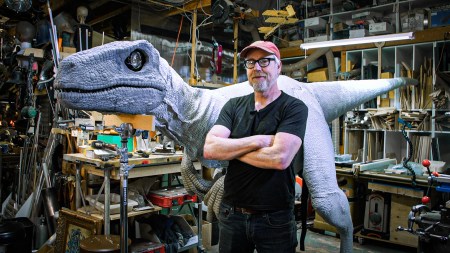
One Day Builds
Adam embarks on one of his most ambitious builds yet: fulfil…

Show And Tell
Adam recently completed a build of the royal St. Edwards cro…
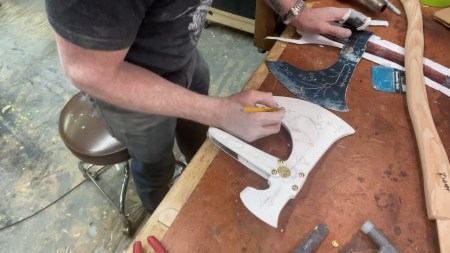
Making
Viewers often ask to see Adam working in real-time, so this …
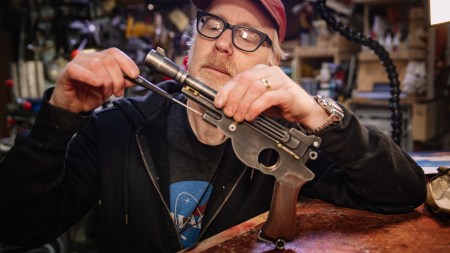
One Day Builds
Adam and Norm assemble a beautifully machined replica prop k…
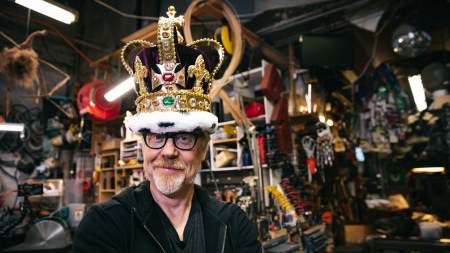
One Day Builds
One of the ways Adam has been getting through lockdown has b…
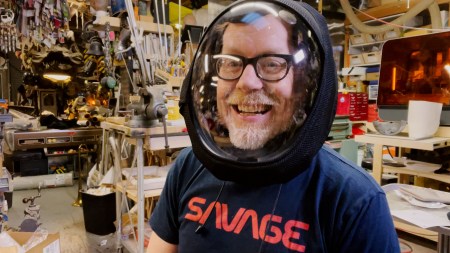
Making
Adam unboxes and performs a quick test of this novel new hel…

Making
When Adam visited Weta Workshop early last year, he stopped …
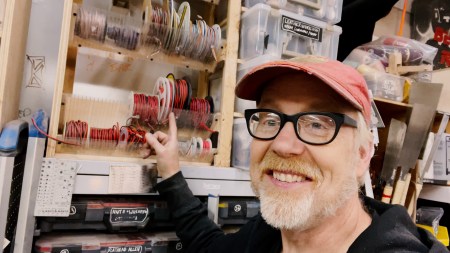
One Day Builds
Adam tackles a shop shelf build that he's been putting off f…
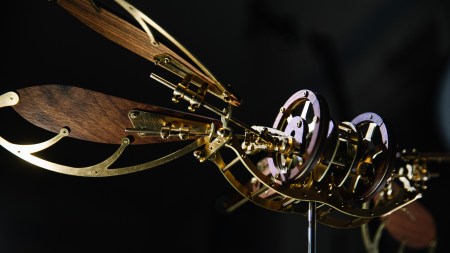
Show And Tell
Time for a model kit build! This steampunk-inspired mechanic…

One Day Builds
Adam reveals his surprise Christmas present for his wife--a …
ahh nothing on part three i wanted to hear your opinion about the thing with the thing and that other thing that does the thing
I better hurry up and read the last 200 pages so I can watch this.
I enjoyed this book so much in its three parts that I can’t wait for Norm to finish so I can hear Adam and Will’s thoughts on the ending! Enjoyed the spoilercast a ton today and will now go on to read another Stephenson book shortly!
My view on the book was a little different than Will and Adam’s. I really enjoyed parts 1 and 2 and found 3 to be a weird offshoot that didn’t resonate with me. It was necessary and gave a resolution to the book but I didn’t become attached to those characters like I did the others. I liked 2 for almost the same reason Will and Adam disliked it, sure it was frustrating, and at times depressing, but the characters persevered nonetheless. That fact drove home the determination of the human race to survive against all odds and in the face of absurd adversity, which I found to be a shining light amid the darkness of part 2.
Loved, loved the book. It took me a bit longer to read it due to other circumstances. But I can’t recommend it enough. Hurry up, Norm. I want to hear the discussion about the third part.
Unlike CarRacer, I really got attached to the main character in Part 3.
Agreed, except I REALLY disliked the third part of the book. I almost couldn’t get through it. Up until that point I would have have given it an almost perfect rating. Still, I’d still recommend it based on the strength of the first two parts alone. I’m looking forward to the next spoilercast on part three to see if there’s a consensus between Norm, Will, & Adam about this.
“We’re one bad asteroid away from never existing”
Asteroids are nature’s way of saying “How’s that space program coming along?”
I know I’m in the minority here, but I really loved NS’s early books (especially The Big U, Snow Crash, Cryptonomicon, Zodiac) for their cheesy campiness. Although his newer books have great concepts, I just feel like they take themselves a bit too seriously. That being said, I still preorder anything he writes.
As many others, Act 3 was difficult. I would have enjoyed it more as another book with more time and attention paid to it. In this context it felt rushed and unfulfilling.
And for the record! – I read it because Adam recommended it.
I rather liked it but they was too much nerdsplaining at times and the third act needs another book to follow through. Still enjoyed my time with it.
really… thats what the title means…. literally the first thing that entered my head!
DOH!
still sounds like a good read
i haven’t finished it yet….gonna hold off listening till i do. then maybe and i can do one of our own. hahahah.
I felt like there were so many unanswered questions at the end of the book.
One of my questions is what the heck happened to Red Hope?
I am so glad that I am not alone with the struggle of part three. I couldn’t put down 1-2 and then 3 just brought me to a few pages each night. Eventually I started to enjoy it and I would say the last half of part 3 was good, but I wanted to carry on after part two with the struggle of surviving and thought three should have been a separate book. I have a big problem with one group in three, but wont go into any detail so I don’t spoil the ending.
Of course, now I want to know what your problem is with Part 3. I think I know, but I’m not sure.
edited: sounded kinda harsh when I re-read it.
Spoilers ahead:
There were several parts of the book that irked me and made it hard for me to accept the plot.
I had a Love/Hate relationship with this book, or rather a Love/Annoyed relationship. I loved the overall set up and for the most part, the plot developments. I just wish the author had spent as much time developing his characters as he did the world (current and future) in which they live. There wasn’t a single bit of character development, or plot development, that wasn’t interrupted by pages and pages (and pages) of (mostly annoying) technical explanations of the environments, systems, orbital mechanics, ad nauseum! This book needed a serious run through the hands of an Editor. Or at the very least, move the tedious environmental explanations out of the main stream of the narrative and into appendices.
I actually liked the third part of the book more than the second, although it ended just as it became interesting. It was so obviously a (annoying) set up for a sequel. I felt a little cheated. Having a sequel in mind when you write a book is fine, just end it with a little more satisfying conclusion.
I have to say , I wasn’t impressed overall – It was okay. Some good ideas and showcases of interesting concepts, but then other parts where the character behaviors and motivations were ludicrous. I especially couldn’t buy the idea that anything that happened in the 21st century was relevant or important in a society 5000 years later. That like saying modern society is still a complete 1 to 1 reflection of ancient Sumerian politics and issues. No possible human civilization works like that , even a few hundred years completely rewrites the basic values, issues etc. I can’t remember the last time Queen Anne or the French revolution came up in day to day conversation, let alone something that happened 5000 years ago.
Really enjoyed reading this book. The first two parts had me gripped and I flew through them. The third part though, it didn’t feel connected to me. I know it was 5000 years after the main events, but it just felt like something was missing.
Still, another great recommendation by the Tested team. Might I suggest that it’s time to start a regular book club podcast?
(Tested comments could really use a spoiler tag for discussions like this)
There’s no good historical analog where the whole of society was under that much stress though. Add into that having a recording nearly every moment of the people who’s decisions decided the fate and the shape of the civilization you’re living in and it’s not surprising that the story of The Ride (or what ever it was called read it a while ago) became a large part of the fabric of the future society. Having such a huge interest in the people who quite literally (genetically) shaped all of humanity isn’t outlandish to me in the slightest.
Science has actually proven that spoilers are irrelevant to the enjoyment of a book
http://ucsdnews.ucsd.edu/archive/newsrel/soc/2011_08spoilers.asp
SPOILER ALERT !!!
SPOILER ALERT !!!
SPOILER ALERT !!!
Hello Chaps,
Thanks for the excellent podcast. We definitely need part 2. Also thanks for recommending this my first Neal Stephenson book (and the Martian).
Ok. The one thing you missed is, to me, the very obvious link between the book’s title “Seveneves” and a nonfiction book by Dr. Bryan Sykes (former Professor of Human Genetics at the University of Oxford, Endland) called “The Seven Daughters of Eve” ( http://tinyurl.com/ppskhuw). Anyway, very briefly, the book expounds the genetic theory that the characteristics of human mitochondrial DNA link modern European humans to our prehistoric ancestors. Sykes traces back human migrations to seven “clan mothers”. The seven “clan mothers” each map to one human mitochondrial haplogroups (Ursula, Xenia, Helena, Velda, Tara, Katrine, Jasmine). This is the basis of the “out of Africa” human origin theory. [Note that the Seven Daughters are the roots European lineage only, which is where this theory diverges from the Seveneves “rebirth”].
This could all just be a huge coincidence of course, but a very interesting one. Anyway, the first half of Dr. Sykes’ book is a very good read. I highly recommend. Unfortunately the second half of the book of fanciful conjecture. He is not a good fictional writer.
Regarding Stephenson’s book, I actually found part 2 the best and most gripping. I also have to disagree with Adam’s view that the conclusion was an optimistic vision of the tenacity of the human race. I thought that it was rather depressing musing on human nature; in that, after wiping the slate clean (kind of) we ultimately end up in exactly the same position as now. That of East vs. West military conflict, and the ultimate driving force of human achievement being competition not co-operation. Sorry to end on a rather depressing note.
Best, David.
Unlike many here, I really enjoyed the contrast of the 3rd act, and enjoyed it right until the end. Felt very unresolved with the ending. Didn’t answer nearly as much as I wanted, didn’t share the same richness or attention to detail that so much of the setup had. Great read, just didn’t feel like he had anything left in the tank and phoned it in when it came to tying up loose ends.
Red Mars is probably one of my favorite books of all time. The other two get too political/psychological for my tastes.
Chiming in on the side of a very enjoyable, riveting, nail-biting, page-turning and ultimately mournful first and second act.
The third act really should have been given its own book, in order to more organically allow the reader to absorb the technical, historical, and political minute of the world of 5000 years in the future. It felt very disappointing.
Given all the slow but necessary technical data the reader needs for the third act, the actual narrative and plot movement in that section feels too rushed, and after finishing, I don’t feel that I really know how and why the end of the book panned out the way it did.
Despite the third act, here’s hoping for a second book in this universe!
Another book to read? Fine, see you guys later….
I wish I could of had Adam’s experience with the Seven Eves scene. I guessed it pretty early on and then I was just frustrated by the characters decision. There are things like this which I would have much rather preferred than the decision they made: http://time.com/3748019/same-sex-couples-biological-children/
I think the end result would have been much more interesting, and more grounded in reality.
Also, Aïda’s concerns about being ostracized for being a cannibal and not because her actions resulted in a greater percent loss of human life than probably anyone else in history really bothered me (I wasn’t counting deaths so I could be wrong). Although I did like how the gun always resulted in a huge amount of death and chaos.
As for part 3, I really think that could have been a different book. I don’t really think part 1 or 2 needed it. Although, if I’m honest, I like the comfort of an author telling me the future.
I discovered Neil with Cryptonomicon almost 15 years ago. I have tried to catch everything he has written before and since. When I started Seveneves, I didn’t even know how to pronounce the title properly.
When the big reveal hit at the end of part 2 it blew me away! Just like you Adam, it was “Of Course”, how could it be anything else! Since the three of you mentioned this book ( I was just finishing it at the time) I’ve looked forward to hearing your take.
Book clubs take note. Get Norm back ASAP and get to the discussion of part 3. I won’t hold my breath, but time is short and water may rise at any moment.
Thanks for your insights.
Read this and just picked up Aurora 🙂 Love the spoilercast!
Thanks guys. I loved the book. Found it hard to get into for some reason but got there in the end. 🙂
I loved this (audio)book. The narrator for act 1 and 2 was so-so, the narrator for act 3 was better. I even enjoyed act 3. I disagree with some of the comments above, I think as a separate book act 3 would kind of not be enjoyable at all. I think people didn’t like act 3, because it was soooo different from the other two, and it was meant to be like that because of the vastness of time. Once I thought about it in that light, I can reconcile it with the remainder of the novel.
I was surprised that Adam and Will didn’t really bring up the fact that the book really focuses only on Ivy and Dinah’s descendants. Act 3 starts off Moiran, but quickly and strongly coloured by the actions, Dr. Noah (Ivan) Tyuratam Lake (Dinan), the diggers (Dinah lineage) and the Pingers (Ivy’s partners lineage).
With that said, Adam and Will did mention that it is a well developed “world” for Stevenson “the other parts of this world”, but they didn’t dig into that very much. There are entire volumes that can be written about the “diggers”, “pingers”, Red Hope, “The Reds”. Also, it’s certainly foreseeable that other pinger or digger races came through the apocalypse but haven’t yet been discovered. How about space fairing races that left the Cleft or the Ring, in the intervening 5k years before the events of Act 3, that may have gone to Mars.
Dang it. I had to stop the podcast, buy the book and start reading!
I love everything Stephenson has ever written but this book drove me crazy. Over 250 pages of orbital mechanics, most of which could have been cut by a decent editor. It actually made me question reading his next novel, which none of his earlier work ever has done.
My review from Goodreads.com:
As the joke has been going, if you enjoy orbital mechanics as a main character, you’ll enjoy this novel. I was commenting to someone that the book could be 100 pages shorter if we dumped the super detailed description of orbital mechanics that occurs as an info-dump over and over again. Then I met someone who had gotten annoyed enough to begin counting pages when it happened and got to around 259 pages of it. *sigh*
Stephenson is the Stephen King of Science Fiction: only writes massive novels that no editor is up to the challenge of editing (and I *liked* Reamde!). There is a kernel of an excellent novel (or two) here but this is just a monstrosity that I finished out of spite.
The novel is divided into thirds:
1) Lead up to the destruction of Earth in a few years’ time
2) The orbital antics following the destruction
3) 5000 years later with the re-terraforming of the Earth
The first third was a pretty good novel. The last third *could* have been a decent novel with a bit of work. The middle third was kind of shit. All of this with waaaaaaaay too much detail on how space mechanics work from an author who was a consultant at Jeff Bezos’ private space venture in Seattle.
Needless to say, I was disappointed and question whether I’ll be reading any more of Stephenson’s tomes after all of this, and I’ve read every novel he’s ever written.
Spoiler Cast? Had to get the book and get going. Got the audio book to make progress during my commute. Ooooh. NOT nearly as good as The Martian audiobook. The woman doing the read can’t pull off men’s voices. Especially accents. Just a warning. Not far enough in to comment on the story.
As I’ve just got a copy of the book I have nothing to say about it except that IT’S FRICKING HUGE HOW THE HELL DID ADAM READ THIS IN A WEEKEND. That is all. 😉
1.) It is a pretty optimistic portrait of what might happen, the book also doesn’t really focus on what’s happening on the surface so there could have been lots of strict policing/state of emergency policies that kept the chaos to a minimum.
2.) It is odd just a choice
3.) Digging large underground structures takes a long time the Chunnel took 6 years to go 31 miles in fairly shallow areas in pretty soft stone. Digging a large area then furnishing and prepping it to house people for 5000 years is a huge task. I think a lot of it can be explained as “we only have enough time and resources to make one big plan work” and the Izzy plan was the one that got the most traction.
I’m really interesting in how in the hell the submarine crew(s) are supposed to have survived.
SPOILER: I totally reject the premise of the ‘exponential’ effect of the moon’s 7 parts grinding each other to dust. It would surely be the reverse- no energy is being added after the ‘agent’ hit- so with each consecutive hit energy would be lost in heat and destruction would decrease. I’m only 2 hours into the audiobook but now finding it hard to take seriously.
No no no, bad science. Back to your room.
I didn’t have nearly Adam’s reaction to the title-meaning reveal, but it was very cool. The scene they mentioned where Dina’s Dad had to be pulled away from the transmitter into the mine is what got me. It’s probably one of those things that hits me harder now that I have kids, but damn… got something in my eye at that exact moment. Surprisingly there wasn’t exactly a moment like that for Doob and his family but that, while sad, didn’t hit as hard.
A point that has stuck in my head is this: if they had Moira doing some hard core genetic engineering and creating Y chromosomes or whatever, why did she not go to the store of male DNA they had in all the bodies of those that died at the end of the trip. IIRC at least Doob and a few others were definitely there, and while they were dead, they were frozen and it seems Moira didn’t need functional sperm, just a good genome sample, which should have been easy. Then bam, instant genetic diversity, or at least more than cloning only the 7 survivors. Am I missing something important that would prevent this?
The Martian supplanted Cryptonomicon and Seveneves supplanted the Martian. Thanks for recommending these I just finished Seveneves last weekend. Keep them coming. Also congrats on the U2 flight Adam. I was so happy for you!
i read the martian thanks to tested. and that was the best book i ever read in a long time. i even re read it again.
so when they talked about this one, i had to read it also. and i didn’t like it. the whole book reads to me as a “look how smart i am” by the writer, follow with a “this is what i think about american politics” and then part 3, this is how the human should be. don’t get me wrong, i did enjoy some parts of it, but it felt to much as a hidden agenda from the writer to me. i think that the same book, but in 300 pages instead of 900 would be a big improvement. as for the name, due to not knowing how to pronounce it (i’m not a english speaker as you can read) i just realized it when i saw this podcast.
I read and enjoyed “SEVENEVES”, picked it up since I knew you guys were going to talk about it.
I would have enjoyed it a great deal more if I hadn’t read “The Martian” first… Andy Weir has raised the bar for science crisis story telling very high.
Over all I enjoyed it, but I’ll admit I liked Part 1 the best, Part 2 made me want to throw things through most of it but has redeeming moments and Part 3 seemed, perhaps like it wasn’t part of the other parts, the change of tone bothered me.
One thing I noted about Part 1 was that it reminds me of the George Pal movie “When Worlds Collide”. It covers much of the same territory updated to the modern world. Perhaps one of the reasons I liked that section the best.
Like most of Stevenson’s books, characters are more arctypes than deep characters. And he also indulges himself in being far to Meta much of the time and he needs to up his game when it comes to people using organic language when naming things. His nicknames and invented nomenclature always strike me as he’s trying too hard to be clever and rarely do they sound natural or organic.
Bot over all, the book is very much like old time Space Opera and he’s not holding back. Not many authors have done such levels of destruction in a story and successfully brought it back to viability.
I realize I am still only about a quarter of the way through this book so forgive the preemptive judgement. I am enjoying this book but I find it illogical for the entire planet to be focusing on sending a tiny portion of the population into space when it would be infinitely easier to keep people alive on the planet. Just the ability to work in an atmosphere solves most of the problems. If anything efforts should be made to go underground. Anyway… I shall read on.
After a long list of let downs, I typically NEVER listen to book recommendations from people on the internet. However tested has become the acceptation to that rule! I’ve read every book you guys have recommended and have not been let down once! Keep those recommendations coming!
I ate this book in a couple of days…. I really enjoyed parts 1 and 2 though I think they would have benefited a LOT from a good editor chopping a couple of hundred pages out of each of them.
Part three had SOOOOO much description of things I just did not care about (It’s not that I don’t care but I came to terms with the fact, a long time ago, that I am AWFUL at visualizing something from a written description, so I don’t even try any more) that I found myself flipping page after page looking for dialogue, so I could get on with the “action” (having called the “twists” or “reveals” from a mile off…. ) and then it just kinda stopped, right when it was about to get interesting again.
I think the whole thing would make an excellent mini-series, for sure
3.5-3.75 outa 5
Now, I need a new book, cause I was gonna save this one for my vacation, but you guys SpoilerCast it and my wife read it, so I had to catch up.
Finally finished the book and I did really enjoy it, the first two parts I could barely put down – the third was interesting but the tension had gone (unsurprisingly) so it was less compelling.
I had pretty much the same reactions to various aspects of it that Will and Adam did; the real life inspirations of many of the characters, the deep hatred of Julia and the reveal of the meaning of the title, which sprang into my mind maybe 50 pages before it was explained and it totally shocked me. Not as much as one part that wasn’t mentioned in the podcast, which was when the survivors of ‘the swarm’ return to Endeavour and we learn that 800-odd people who had left had become a mere 11 survivors. That was a huge surprise to me and I think lead to the realisation of the title significance to the tale.
I hope Neal Stephenson does appear in the Reading Room soon, this is the first of his book I’ve read and I’m going to have to rectify that quickly! Looking forward to reading the Kim Stanley Robinson book and hering your podcasts about that also.
Brilliant read, and fascinating hearing an alternate reaction. Unfortunately having it described to me as “Read this book, it starts with the moon blowing up. It’s called Seveneves.” just led to a thought of “sounds apocalyptic followed by the birth of humanity, how biblical.” yet took nothing away from it. I could hear the scorn in Adam’s voice for Julia, very similar to mine which led to part 2 just being a complete page turner to hate read on to find out how she’d meet her inevitable fate that never actually happened. Part of me really hopes it’s never turned into a TV series unless it adds to the story because any abbreviation would take away too much.
The only odd part for me was the idea of them watching The Epic. It was 700 days from Zero until White Sky, then another 2 years to get to Cleft. They said that they’re watching the video footage from aboard the station in its various forms even after landing on Cleft and seeing the children of the Eve’s until their equipment started to fail beyond repair. Pessimistically that’d be 15 years, and I’m sure that there was more than 1 camera. To watch ALL of the recorded footage, even if a bunch was lost, would take several lifetimes; even if they live to 120+.
Am I some kind of monster? Does everyone (like Adam and Will) openly weep from reading books? When I got to the meaning of “Seveneves” in the book I was like “huh… cool” and kept going. As someone else above mentioned, Dinah saying goodbye to her dad was much more emotional for me, but not to the point of crying.
I was really hoping to hear their reaction to the third part. Hopefully they do continue in a future podcast. For me, I thought the fact that the races were so distinct, and the *amount* of racism was extremely unrealistic. After 5,000 years, being in such a confined space, it seems inevitable that everyone would cross-breed until the entire human race (the Spacers, at least) were just a bunch of homogenous gray people. They were as distinct, after 5,000 years, as if they had all lived in completely separate territory and never intermingled.
Also the fact that humans could live for 5,000 years in a cave, or 5,000 years underwater, and be able to A) grow enough food to survive and B) not suffer more ill effects from lack of sunlight, seemed to big of a stretch as well.
If a spoilercast assumes the listeners have read the book, then you don’t need to tell us to read it or repeat narrative moments in detail. The discussion of the book is the thing we are here for.
I just finished Seveneves, left this Podcast for about a week to polish off part 3. I loved it. In many ways, part 3’s world reminded me of Robert Holmes’ worldbuilding in Classic Doctor Who (I wonder if having a character named Doctor Hu was intentional). It has definitely made me want sequels to revisit this world, tell more stories of the world of the Seven Eves.
I do have to say, though, that I wasn’t that moved by the reveal of the title’s meaning, because I had assumed that’s what it meant right from part one.
Something I noticed while listening to the audiobook (after having read the book on my Kindle). When Doob is first presenting the idea of the White Sky and the Hard Rain to Julia, he mentions the only way to survive is to escape the atmosphere. Julia replies with something like “then we must go to space, or underground. We shall do both”. So it’s not completely impossible that she had known about the diggers or about the submarine approach,
Hi Adam, I’m new to to web tested.com, been listening for a long time though. Love the work from you all.
If your accepting a book recommendation, I suggest your next reading is by Jasper Fforde, yes with two eFs.
The Eyre Affair. A well written comedic adventure where people have the technology to travel into books for holidays. It’s set in a world where the crimean war was lost and all cheese is illegal. But people travel so often, there is a need for police force, and detectives so the original story doesn’t stray from it’s form.
I enjoyed it. Hope you do to.
Matt.
Is the significance of the title really supposed to be some kind of secret? It’s obvious what inspired it (https://en.wikipedia.org/wiki/The_Seven_Daughters_of_Eve) and when you’ve got a book titled Seveneves (Seven eves) about the annihilation of humanity it’s pretty easy to guess what the title alludes to.
Totally agree. I am having the hardest time finishing part three. Really enjoyed the first two parts but it was like hitting a brick wall for part three. It was interesting hearing the different perspectives. Adam talked about being surprised with the meaning of the title of the book but I found that part fairly obvious.
I also found it interesting how they are projecting their own life experiences on the different characters of the book. Elon Musk, Neil Degrasse Tyson and others all make an appearance in their minds. What I really found intriguing was that they projected a completely different political faction onto the Julia character than I did.
Really cool to see the different perspectives from people on this book.
I agree, if they were confined within the ship and cleft for that period of time I cannot imagine them being distinct and separate races. Interbreeding would be encouraged. The separate races on our planet are the result of different peoples being isolated from each other.
I put this and the next podcast off for over a month! Now that I’ve finally gotten around to the book… no regrets.
Since you guys mentioned the book, I wanted to read it. Finally have (and still am, nearly done), I have not been able to put it down. Between reading it, or listening to the audio-book when driving/full-handed, it has been amazing.
Okay… I was one of the people who pulled the eject cord during the first Seveneves episode when Adam and Will repeatedly demanded as much. Seriously, pulled the cord; yanked the earbuds out of my ears, and didn’t come back until I finished both the audiobook and the Kindle versions.
It has… problems… And not a few. From a storytelling point of view, from a basic writing perspective, it has problems. It reads like a second draft. I don’t want to dump on it or come off as super negative, because I really wanted to like it, I really did. I even went back and gave the audiobook a listen, just to make sure I was giving it a fair shake. I just couldn’t get past the sloppy repetitive and unfocused writing issues- it continuously pulled me out of the world/story. A lot of reviewers are complaining about it being “technically” dense, or “too technical” to get into. I would describe it as tediously repetitive, in triplicate. I would also describe it as more as a good semi-technical semi-hard SF story, with potential. Just in need of a good editor.
SPOILER-ish I guess; Like Norm, I too saw the eponymous title-turn coming early on. From the first interactions of Ivy and Dinah on the banana, it was just so obvious (once the seven objects began broke up); An extinction-level event/disaster story where every character’s gender is (with an exception or two)… And the title of the thing is…
Part 3 was far more readable for me. The only comparison I can possibly give is RAMA. It at least strove in that massively epic hard-SF Clarke kind of way. So, props where they are due.
Oh, also, as an aside, (this is something I’m really sensitive about, on a very personal level), I really didn’t think it was necessary for the cannibal to be bipolar. Currently, mental health “stuff” is getting infused with so much stigma, unwarranted stigma, by our politicians and TV pundits looking for a scapegoat, marginalizing a significant population who lack recourse (regarding mass shootings). Effectively punching down on a group, in order to sidestep the real statistics of real problems. It would be really nice to make it through a story where the darkest of dark horrors and worst atrocities are committed by the people who statistically/actually commit them; “normals” having a bad time. I am unaware of a survival-cannibal situation, in history, that didn’t involve very ordinary people, otherwise, who weren’t starving to death.
I get the themes Stephenson was striving for. My points are really; 1) not a great time for BPD stuff in pop culture, or mental health stigma stuff in general; 2) Aida’s BPD stuff could have been omitted entirely without altering themes/or part 3.
Apologies for the 4AM spellings and grammers :p
Still catching up, but I would also recommend The Dark Beyond the Stars. Sounds much like Aurora by Kim Stanley-Robinson.
The Dark Beyond the Stars is a 1991 science fiction novel by Frank M. Robinson. It is a Lambda Literary Award winner, published by Orb Books.